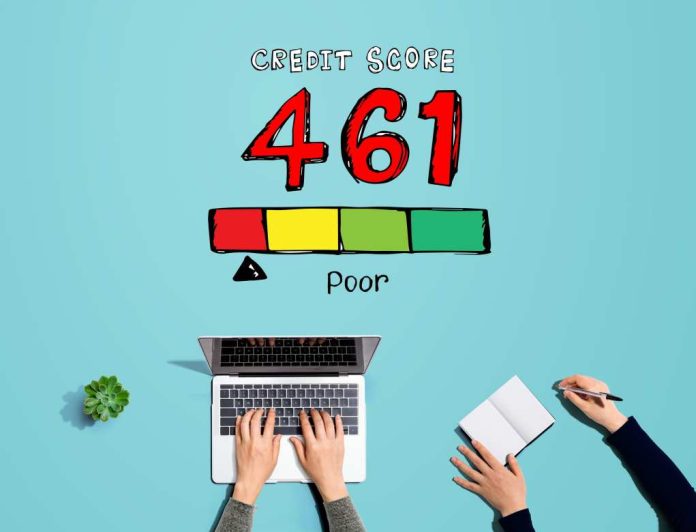
Why did my credit score drop for no reason? If you’ve experienced a drop in credit score and have no idea why, you’ve come to the right place. We’ll break it all down for you below.
Being an adult is hard. There are many parts of life that you need to deal with. One important part of life is your credit score. Your credit score can help you in more ways than you realize. However, if you have a low score, then you may run into a variety of different issues.
When monitoring your credit, you may see that your score decreased from the last time you checked. If that’s the case you may be wondering, “why did my credit score drop?”. The answer may be more simple than you realize (but it could also be bigger than you realize too)!
Fortunately, you won’t have to wonder any longer. Today, we’ll address the most common reasons credit scores drop and what you can do about it. First – let’s go over a brief overview of credit scores in general.
A Brief Overview of Credit Scores
Before learning about why your credit score decreased, you want to make sure you have a clear understanding of what credit scores are, why they are important, etc. Your credit score is a number that’s generally between 300 and 850. Lenders use this number in order to better understand the risk they face with you as a borrower. This is known as your creditworthiness.
Your credit score doesn’t just come from nowhere. Credit bureaus (also known as credit reporting agencies) use the information found on your credit report to calculate your score. There are three major credit bureaus which are Transunion, Equifax, and Experian. Your report has information about your credit accounts like your payments, balances, etc. When calculating your score, credit reporting agencies will use a scoring model in order to determine how each item on your report will play a part in your score.
There are two main scoring models. There is the FICO model and the VantageScore model. The scoring model varies depending on the credit bureau. However, the FICO model is more common since it is used by 90% of top lenders.
How to Check Your Credit Score
If you want to know your credit score standing there are plenty of different ways that you can check your score. You can:
- Use a Third Party App
- Check with Your Card Issuer
- Get in Touch with a Credit Counselor
Use a Third Party App
As technology advances, so do the ways that people can check their credit scores. There are apps like Credit Karma, Mint, and more that allow users to get a peak at their scores. Not only do these apps allow people to check their scores, but they may also even provide additional services that help people manage and monitor their finances!
Check with Your Card Issuer
Another easy way to see your score is by checking with your card issuer. For example, Capital One has an online platform for users to use. On this platform, they allow people to easily check their credit scores. Your card issuer will likely have something similar that allows you to see your score.
Get in Touch with a Credit Counselor
Credit counselors are trained and certified individuals that work at credit counseling agencies. Credit counseling agencies are typically non-profit organizations. Their goal is to help consumers with a variety of personal finance issues like debt management, credit, and more. A credit counselor can help you check your score and better understand your credit as well.
How Does Your Credit Score Stack Up?
The rank of your credit score will depend on the scoring model that is used by credit reporting agencies. For the popular FICO score:
- Poor (credit scores between 300 and 579)
- Fair (credit scores between 580 and 669)
- Good (credit scores between 670 and 739)
- Very Good (credit scores between 740 and 799)
- Exceptional (credit scores between 800 and 850)
However, the VantageScore model has different rankings. According to the VantageScore model:
- Very Poor (credit scores that are between 300 and 499)
- Poor (credit scores that are between 500 and 600)
- Fair (credit scores that are between 601 and 660)
- Good (credit scores that are between 661 and 780)
- Excellent (credit scores that are between 781 and 850
Why Did My Credit Score Drop for no Reason?
Now that you have a better understanding of your credit score, you can begin to learn how to manage your score. You may have noticed that your credit score decreased from when you last checked it or you may notice that it’s lower than you thought it would be.
If that’s the case, then you will want to make sure that you know why that happened. This knowledge can help you correct the issue! It’s important to keep in mind that everyone is different and an online article cannot tell you exactly why your score in specific decreased. Instead, we will show you common examples of ways that people can lower their score. These examples may be applicable to your situation!
So – why did my credit score drop for no reason?
There are plenty of different reasons that can cause a credit score to be lower. When reviewing these different examples, you will want to keep in mind the factors that can impact your score that we mentioned above! Some of the reasons that your score could decrease include:
- Late Payments
- Too High of a Credit Utilization Ratio
- Lower Credit Limit
- Closed Credit Card or Paid Off Loan
- Hard Inquiry
- Errors on Your Credit Report
Late Payments
When you are not up to date with your payments, your credit score can seriously go down. In fact, if you have a perfect credit score but are 30 days late on a payment then your score could decrease by up to 100 points!
Yeah, that’s a lot.
Even if you don’t have a perfect score, you can expect to see some serious damage. If you have missed payments altogether and don’t even try to repay the debt then the account may get sent to collections. Once you have a collection account on your credit report then you can expect a score decrease of up to 110 points!
If this is what you’re struggling with, look into credit repair to remove late payments.
Too High of a Credit Utilization Ratio
Remember, your credit utilization ratio looks at your overall credit limit compared to how much credit you currently use. If your credit utilization ratio gets too high, then that can hurt your score. A good guideline is to keep your credit utilization below 30%.
Lower Credit Limit
Let’s say your overall credit limit was $2,000 but your credit card issuer reduced it to $1,200. If you were currently using $800 then your credit utilization was 40% with a credit limit of $2,000.
However, after your score decreased, your credit utilization would be 66% which is much higher. This can result in your score decreasing since it’s further away from that 30% recommendation.
Closed Credit Card or Paid Off Loan
Regardless of whether you close a credit card or pay off a loan, these actions impact the age of your credit, your available credit balance, and more.
For example, let’s say your oldest credit card was 10 years old, and your second oldest credit card was 5 years old. If you close down the 10-year-old credit card account, then that means the oldest active account you have is just 5 years old.
Hard Inquiry
As we said earlier, a hard inquiry is needed in order for lenders to get the in-depth look they need to determine the eligibility of a borrower. For example, lenders would need to submit a hard inquiry if a borrower is trying to get a new line of credit.
However, these inquiries can result in a negative impact on your score by up to 5 points. It’s important to make sure you don’t rack up too many of these and submit too many hard inquiries at once.
Errors on Your Credit Report
Nothing is perfect in life. That same saying is true when it comes to your credit report. Luckily, under the Fair Credit Reporting Act (FCRA), credit reporting agencies must make sure the information on a consumer’s credit report is accurate.
That means if you find an error on your report, you can submit a dispute with the credit bureaus. The credit bureaus will then review the dispute to see if the item is actually inaccurate. If it’s found to be invalid, it will be removed from your credit report which can also get rid of the impact it has on your score!
Can You Improve Your Credit After a Credit Score Drop?
Yes! Luckily, there are plenty of ways that you can improve your credit depending on the reason for the credit score drop. For example, if your credit utilization ratio is too high, then you can work on paying down your credit.
The way to improve your score will vary on the issue you are dealing with. That is why it can be helpful to get in touch with a professional like a credit counselor. They can provide you guidance on handling your specific credit situation.
When Do Items Fall Off Your Credit Report?
An important part to keep in mind when it comes to negative items that can impact your score is that they may fall off your credit report:
- Hard inquiries fall off after 2 years
- Late payments fall off after 7 years
- Foreclosure falls off after 7 years
- Short sales fall off after 7 years
- Collection accounts fall off after 7 years
- Chapter 13 bankruptcies fall off after 7 years
- Unpaid taxes fall off after 7 years or can stay on there indefinitely
- Unpaid student loans fall off after 7 years or can stay on there indefinitely
- Chapter 7 bankruptcies fall off after 10 years
Get Professional Help to Reverse Your Credit Score Drop
Regardless of why your credit score dropped, you need to take immediate action to rectify the problem. You have a few different options – but the best is to look into credit repair.
You can consider credit repair vs credit counseling, credit repair vs paying off debt, or even credit repair vs chapter 7 bankruptcy. You can even look into credit repair for low income families or credit repair for veterans – as there are specific tactics you can leverage that others don’t have access to.
Why Did My Credit Score Drop for No Reason? Wrapping Things Up
There you have it – hopefully, this answers your question: why did my credit score drop for no reason? As you now know, there is no one-size-fits-all answer. Some reasons that people can see a credit score decrease include:
- Late Payments
- Too High of a Credit Utilization Ratio
- Lower Credit Limit
- Closed Credit Card or Paid Off Loan
- Hard Inquiry
- Error on Your Credit Report
However, your situation may be different. That is why you could benefit from a professional like a credit counselor. Credit counselors can give you guidance on your credit situation to help you make the best decision possible and get a good credit score.
Want to learn more about credit – and how you can keep yours dialed in? We have a plethora of great resources in our blog for you. Learn how credit repair companies are able to remove collections.
















